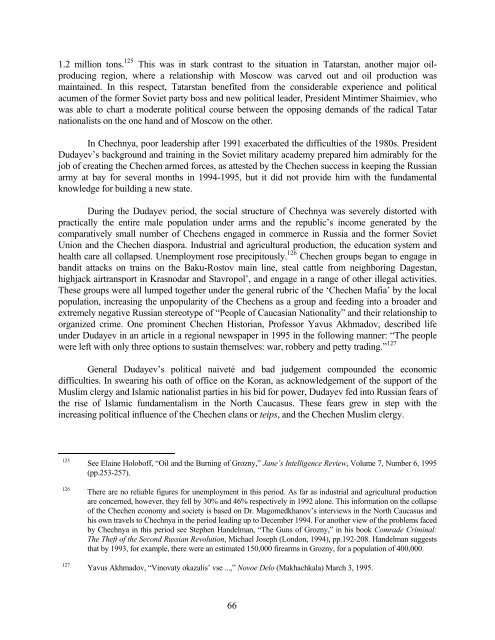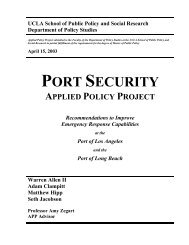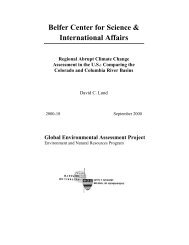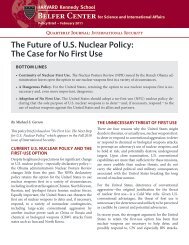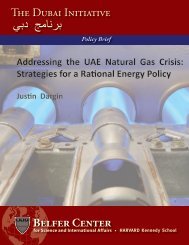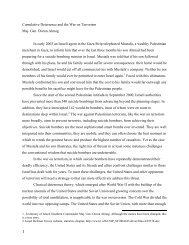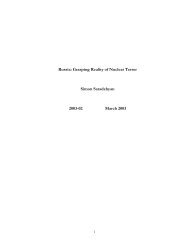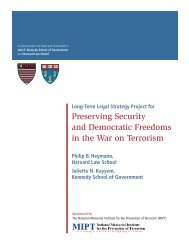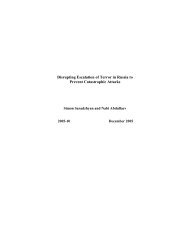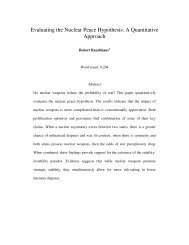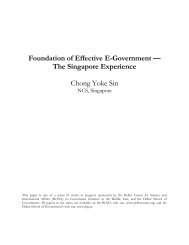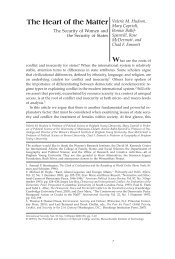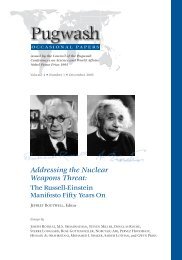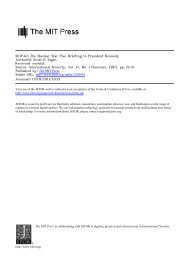RUSSIA'S TINDERBOX - Belfer Center for Science and International ...
RUSSIA'S TINDERBOX - Belfer Center for Science and International ...
RUSSIA'S TINDERBOX - Belfer Center for Science and International ...
You also want an ePaper? Increase the reach of your titles
YUMPU automatically turns print PDFs into web optimized ePapers that Google loves.
1.2 million tons. 125 This was in stark contrast to the situation in Tatarstan, another major oilproducing<br />
region, where a relationship with Moscow was carved out <strong>and</strong> oil production was<br />
maintained. In this respect, Tatarstan benefited from the considerable experience <strong>and</strong> political<br />
acumen of the <strong>for</strong>mer Soviet party boss <strong>and</strong> new political leader, President Mintimer Shaimiev, who<br />
was able to chart a moderate political course between the opposing dem<strong>and</strong>s of the radical Tatar<br />
nationalists on the one h<strong>and</strong> <strong>and</strong> of Moscow on the other.<br />
In Chechnya, poor leadership after 1991 exacerbated the difficulties of the 1980s. President<br />
Dudayev’s background <strong>and</strong> training in the Soviet military academy prepared him admirably <strong>for</strong> the<br />
job of creating the Chechen armed <strong>for</strong>ces, as attested by the Chechen success in keeping the Russian<br />
army at bay <strong>for</strong> several months in 1994-1995, but it did not provide him with the fundamental<br />
knowledge <strong>for</strong> building a new state.<br />
During the Dudayev period, the social structure of Chechnya was severely distorted with<br />
practically the entire male population under arms <strong>and</strong> the republic’s income generated by the<br />
comparatively small number of Chechens engaged in commerce in Russia <strong>and</strong> the <strong>for</strong>mer Soviet<br />
Union <strong>and</strong> the Chechen diaspora. Industrial <strong>and</strong> agricultural production, the education system <strong>and</strong><br />
health care all collapsed. Unemployment rose precipitously. 126 Chechen groups began to engage in<br />
b<strong>and</strong>it attacks on trains on the Baku-Rostov main line, steal cattle from neighboring Dagestan,<br />
highjack airtransport in Krasnodar <strong>and</strong> Stavropol’, <strong>and</strong> engage in a range of other illegal activities.<br />
These groups were all lumped together under the general rubric of the ‘Chechen Mafia’ by the local<br />
population, increasing the unpopularity of the Chechens as a group <strong>and</strong> feeding into a broader <strong>and</strong><br />
extremely negative Russian stereotype of “People of Caucasian Nationality” <strong>and</strong> their relationship to<br />
organized crime. One prominent Chechen Historian, Professor Yavus Akhmadov, described life<br />
under Dudayev in an article in a regional newspaper in 1995 in the following manner: “The people<br />
were left with only three options to sustain themselves: war, robbery <strong>and</strong> petty trading.” 127<br />
General Dudayev’s political naiveté <strong>and</strong> bad judgement compounded the economic<br />
difficulties. In swearing his oath of office on the Koran, as acknowledgement of the support of the<br />
Muslim clergy <strong>and</strong> Islamic nationalist parties in his bid <strong>for</strong> power, Dudayev fed into Russian fears of<br />
the rise of Islamic fundamentalism in the North Caucasus. These fears grew in step with the<br />
increasing political influence of the Chechen clans or teips, <strong>and</strong> the Chechen Muslim clergy.<br />
125 See Elaine Holoboff, “Oil <strong>and</strong> the Burning of Grozny,” Jane’s Intelligence Review, Volume 7, Number 6, 1995<br />
(pp.253-257).<br />
126 There are no reliable figures <strong>for</strong> unemployment in this period. As far as industrial <strong>and</strong> agricultural production<br />
are concerned, however, they fell by 30% <strong>and</strong> 46% respectively in 1992 alone. This in<strong>for</strong>mation on the collapse<br />
of the Chechen economy <strong>and</strong> society is based on Dr. Magomedkhanov’s interviews in the North Caucasus <strong>and</strong><br />
his own travels to Chechnya in the period leading up to December 1994. For another view of the problems faced<br />
by Chechnya in this period see Stephen H<strong>and</strong>elman, “The Guns of Grozny,” in his book Comrade Criminal:<br />
The Theft of the Second Russian Revolution, Michael Joseph (London, 1994), pp.192-208. H<strong>and</strong>elman suggests<br />
that by 1993, <strong>for</strong> example, there were an estimated 150,000 firearms in Grozny, <strong>for</strong> a population of 400,000.<br />
127 Yavus Akhmadov, “Vinovaty okazalis’ vse ...,” Novoe Delo (Makhachkala) March 3, 1995.<br />
66


